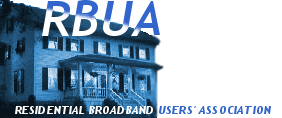









|
RBUA
The Residential Broadband Users’ Association
February 20th, 2002
Our stance on server usage has always been that "casual" servers are allowed to be run in conjunction with any and all broadband internet services. A casual server is defined as that which is private (i.e. non-advertised), low bandwidth- particularly during peak hours- carries only legal material and is secured against outside intrusion. Here is an even clearer and more in-depth description, listed at https://www.rbua.org/announce/11-09-01.php:
- "DHCP will not, in any way, hinder your ability to run a server. Just keep in mind that Rogers doesn't trust us subscribers to run our own servers. This is actually quite understandable, given the amount of carnage I've borne witness to, caused by misconfigured servers. Some that I've come across were, unfortunately, just downright abusive, run by a few of our well-meaning, but clueless compatriots. Please allow me to stress that unless you know exactly what you're doing, don't attempt to run a server on your connection. Revisiting an old issue, if you do want to run a server, you must take a number of precautions before and while running the server:
- First off, make sure that it doesn't contain security holes that are wide enough for a truck to be driven through. Look up all the latest exploits for your server and plug them up with the latest patch(es). This is especially important if you are running some of Microsoft's server software, such as their web server, IIS.
- Second, take the time to configure it correctly. If you don't know even how to configure it, don't run it first and ask questions later. Learn what you need to know before you place the server online. Also, it's generally a good idea to restrict access to your server, so only people you know can gain access to it. For instance, if you run an SMTP (outgoing mail) server and some stranger ends up spamming 10000 messages through you, Rogers will take you down and we wouldn't be able to help you.
- Third, be very mindful of how much bandwidth is used by your server, and at what times during the day and night it is most active. Rogers has stated to us at several points in the past that only "casual" servers are allowed on the R@H service. This is defined as servers that are "low" bandwidth, particularly during peak hours (~4:30 PM to ~1:30 AM EST). Servers must be private (i.e. not advertised on websites, search engines, etc.) and secured against outside intrusion, as detailed in the last two points. Although Rogers has never clearly stated the definition of "low" bandwidth, just being careful about this will ensure that you don't cause any problems and that you don't run into any of them, either. Constant and saturated server activity, though, especially during peak hours, is bound to draw some red flags.
- Lastly, if you don't understand all of this terminology, or don't know how to perform the above precautionary measures, then I strongly recommend against running any servers at this time. Seriously. You're liable to do more harm- both to your own connection and those of others- than good."
If you follow these rules, neither Rogers, Bell, nor anyone else can make you remove your server(s). They have no legal recourse to do so, unless you have done something that makes you into an "abuser". In that case, you can be disconnected, or have your service disrupted, if you don't heed your service provider's initial warning(s). We, at the RBUA, cannot- will not- help anyone who is fairly labelled an abuser. Otherwise, we most certainly WILL.
--RBUA Senior Council
|













